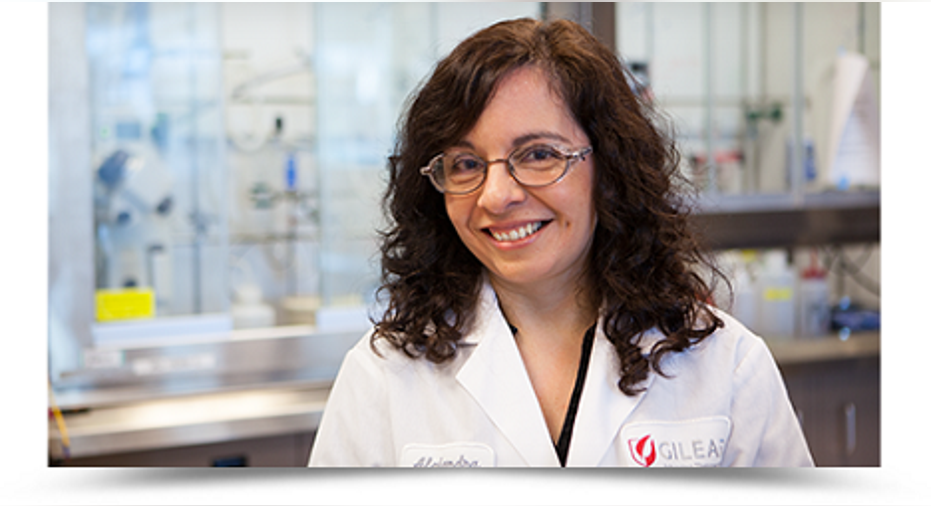Gilead Sciences, Inc. Reports Disappointing Q1 Harvoni Sales

Image Source: Gilead Sciences.
Gilead Sciences started off 2016 on a bad note. Shares of the big biotech fell more than 17% by February before bouncing back. Investors hoped for good news from Gilead on Thursday when the company announced its first-quarter earnings results.
Unfortunately, those results turned out to be disappointing, with Gilead's shares falling more than 8% the morning after the report. Here are the highlights from the biotech's first-quarter results.
By the numbersGilead reported total revenue in the first quarter of $7.8 billion. That figure reflected a 2.6% increase from the $7.6 billion posted in the prior-year period. The biggest source of revenue stemmed from product sales, although Gilead also recorded $113 million from royalty, contract, and other revenue sources.
The bottom line looked worse, however. Gilead announced earnings of$3.6 billion, or $2.53 per diluted share. That's a steep drop from the$4.3 billion, or $2.76 per diluted share reported in the first quarter of 2015. On a non-GAAP basis, Gilead posted earnings of$4.3 billion, well below the$4.6 billion notched in the prior-year period.
However, thanks to share buybacks, Gilead's non-GAAP earnings in the first quarter of $3.03 per diluted share represented a slight increase over the $2.94 per diluted share reported in the first quarter of 2015.
Gilead shelled out a hefty $8 billion on buying back shares in the first quarter. The company also made an upfront payment of $300 million to Galapagos NV , and spent another $425 million on shares of the smaller biotech. In exchange, Gilead obtained rights to Galapagos'JAK1-selective inhibitorfilgotinib. These cash outlays lowered Gilead's total cash stockpile, includingcash, cash equivalents, and marketable securities, to $21.3 billion from the $26.2 billion on hand at the end of 2015.
Beyond the numbersMany have anticipated a slowdown for hepatitis C cure Harvoni. That slowdown arrived in the first quarter. Sales of the hepatitis C drug dropped to $3.02 billion from $3.58 billion in the prior-year period.
U.S. sales of Harvoni plunged more than 53% year over year. That decline was only partially made up by increased sales in international markets, particularly Japan. Worldwide sales for Harvoni's predecessor, Sovaldi, actually increased to $1.28 billion in the first quarter from $972 million in the same period of 2015.
Gilead stated on its earnings call that the sluggish Harvoni sales stemmed, in part, from payer mix changes and increased pricing discounts and rebates. One factor behind those discounts was that several payers opened up more patients to using Gilead's hep C drugs, but that additional access came with pre-negotiated discounts.
Another factor was new competition. Merck launched its hepatitis C drug Zepatier in January. Harvoni has faced competition in the past, but Zepatier appears to be the most-significant threat yet. Merck priced its drug significantly lower than the list price for Harvoni. Gilead now has a real fight on its hands to go head-to-head against the new rival.
One bright spot for Gilead came from its HIV/AIDS franchise. Every drug in its HIV lineup experienced year-over-year sales growth with the lone exception of Atripla. Genvoya, which won FDA approval in November, posted first-quarter sales of $158 million. The new drug has stolen some market share from Stribild. However, Stribild still managed to generate an impressive 33% year-over-year increase in sales.
Despite the disappointing first-quarter results, Gilead stood behind its previous full-year 2016 guidance. The biotech still expects revenue of $30 billion to $31 billion.
To hit that target range, Gilead must keep Merck from stealing significant market share. The reality for the biotech is that doing so will require it to be more competitive on pricing for its hep C drugs than ever before.
Gilead could have some good news in the coming months. The FDA is scheduled to make a decision on Gilead's Sovaldi/velpatasvir combo by June 28. Also, the biotech recently won regulatory approval for HIV drugOdefsey. Expect second-quarter results to include revenue gains from this new drug.
There's also the potential for Gilead to use more of its cash in ways that benefit shareholders. The Galapagos deal is just one licensing opportunity for the big biotech. Gilead also recently boughtNimbus Apollo, a subsidiary ofNimbus Therapeutics.More acquisitions and collaboration deals could be on the way.
The article Gilead Sciences, Inc. Reports Disappointing Q1 Harvoni Sales originally appeared on Fool.com.
Keith Speights owns shares of Gilead Sciences. The Motley Fool owns shares of and recommends Gilead Sciences. Try any of our Foolish newsletter services free for 30 days. We Fools may not all hold the same opinions, but we all believe that considering a diverse range of insights makes us better investors. The Motley Fool has a disclosure policy.
Copyright 1995 - 2016 The Motley Fool, LLC. All rights reserved. The Motley Fool has a disclosure policy.



















